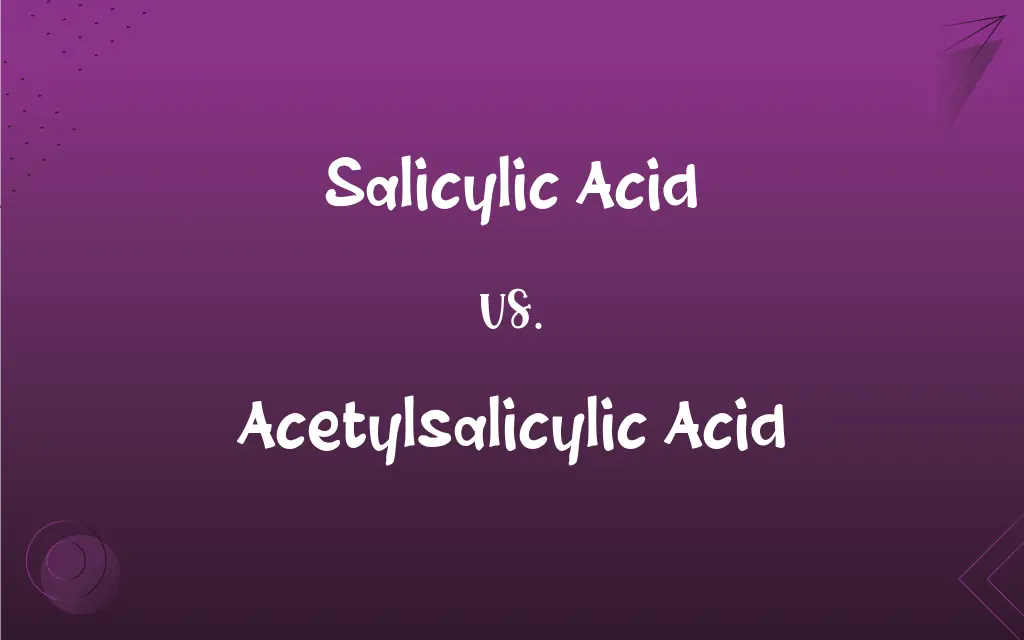Salicylic Acid vs. Acetylsalicylic Acid: What's the Difference?
Edited by Aimie Carlson || By Janet White || Published on January 1, 2024
Salicylic acid is a beta hydroxy acid used topically for skin conditions, while acetylsalicylic acid, also known as aspirin, is used orally for pain relief and anti-inflammatory purposes.

Key Differences
Salicylic acid, a beta hydroxy acid, is primarily used in skincare for its exfoliating properties, helping to treat acne and other skin conditions. It works by loosening and removing dead skin cells. Acetylsalicylic acid, commonly known as aspirin, is an analgesic used for pain relief, fever reduction, and its anti-inflammatory properties. It's taken orally and works by inhibiting the production of certain natural substances that cause pain and inflammation.
Salicylic acid is known for its ability to penetrate into the pores of the skin, making it effective in treating blackheads and whiteheads. It's a key ingredient in many over-the-counter acne treatments. Acetylsalicylic acid, on the other hand, does not have a direct application in skincare but is widely used in medicine for its role in preventing heart attacks and strokes, due to its antiplatelet effect.
In terms of chemical structure, salicylic acid is a simpler molecule with a hydroxyl group directly attached to the benzene ring. This structure contributes to its effectiveness in breaking down the bonds between skin cells. Acetylsalicylic acid is a derivative of salicylic acid, with an acetyl group attached, making it less irritating to the stomach than salicylic acid when ingested.
Salicylic acid can cause skin irritation in some individuals, especially those with sensitive skin. Its overuse can lead to dryness and peeling. Acetylsalicylic acid, while generally safe for most people, can cause gastrointestinal issues, and its use is cautioned in children due to the risk of Reye's syndrome.
Salicylic acid has a keratolytic action, meaning it can soften and remove keratin, a key protein in the skin. This action makes it beneficial for conditions like psoriasis and dandruff. Acetylsalicylic acid, through its systemic effects, is used for conditions such as rheumatoid arthritis and other inflammatory diseases, providing relief from pain and inflammation.
ADVERTISEMENT
Comparison Chart
Primary Use
Topical treatment for skin conditions
Oral pain relief, anti-inflammatory
Application in Skincare
Treats acne, blackheads, whiteheads
Not directly used in skincare
Chemical Structure
Hydroxyl group attached to benzene ring
Salicylic acid derivative with acetyl group
Common Side Effects
Skin irritation, dryness
Gastrointestinal issues, risk in children
Additional Uses
Psoriasis, dandruff treatment
Prevents heart attacks, strokes, treats arthritis
ADVERTISEMENT
Salicylic Acid and Acetylsalicylic Acid Definitions
Salicylic Acid
It works by breaking down keratin in the skin.
Salicylic acid softens the skin by dissolving keratin.
Acetylsalicylic Acid
It has anti-inflammatory properties, making it effective in treating arthritis.
Acetylsalicylic acid helps in reducing inflammation in arthritis patients.
Salicylic Acid
It's known for its ability to exfoliate and unclog pores.
Salicylic acid helps in removing dead skin cells and reducing blackheads.
Acetylsalicylic Acid
Acetylsalicylic acid, commonly known as aspirin, is used for pain relief.
She took acetylsalicylic acid to alleviate her headache.
Salicylic Acid
This acid is effective in treating warts and psoriasis.
The dermatologist recommended salicylic acid for his wart treatment.
Acetylsalicylic Acid
Aspirin is used to prevent heart attacks and strokes.
His doctor prescribed acetylsalicylic acid to lower his risk of a heart attack.
Salicylic Acid
Salicylic acid is a beta hydroxy acid used in skincare products.
She used a cleanser with salicylic acid to clear her acne.
Acetylsalicylic Acid
It works by inhibiting the production of certain substances in the body that cause pain.
Acetylsalicylic acid provides pain relief by blocking pain signals.
Salicylic Acid
Salicylic acid can be found in over-the-counter acne treatments.
Many acne creams contain salicylic acid due to its effectiveness.
Acetylsalicylic Acid
Aspirin can also reduce fever and is often used in cold and flu treatments.
To reduce his fever, he took an acetylsalicylic acid tablet.
FAQs
How does salicylic acid help with acne?
It unclogs pores and reduces sebum production.
What is acetylsalicylic acid?
Also known as aspirin, it's used for pain relief and anti-inflammatory purposes.
Does acetylsalicylic acid have any side effects?
It can cause gastrointestinal issues and should be used carefully.
Are there any natural sources of salicylic acid?
Yes, it's found in willow bark and certain fruits.
Is salicylic acid suitable for all skin types?
Mostly, but those with sensitive skin should use it cautiously.
Can acetylsalicylic acid be used during pregnancy?
It's best to consult a doctor, as it may have risks during pregnancy.
Is acetylsalicylic acid effective in treating fever?
Yes, it can reduce fever and is often used in flu treatments.
Can salicylic acid treat warts?
Yes, it's effective in wart removal due to its keratolytic properties.
Is acetylsalicylic acid safe for everyone?
Generally safe, but not recommended for children or those with certain medical conditions.
What is salicylic acid?
A skincare ingredient used for exfoliation and treating acne.
Can acetylsalicylic acid be used for chronic pain?
Yes, it's effective for chronic pain conditions like arthritis.
Is salicylic acid only used in skincare?
Primarily, but it also treats other conditions like dandruff and psoriasis.
How does acetylsalicylic acid work in the body?
It inhibits enzymes that cause pain and inflammation.
Can salicylic acid dry out skin?
Yes, overuse can lead to dryness and irritation.
What's the difference in the chemical structure of these acids?
Salicylic acid has a hydroxyl group, while acetylsalicylic acid has an acetyl group added.
Can acetylsalicylic acid prevent heart attacks?
Yes, it has antiplatelet effects that reduce the risk of heart attacks.
How often should salicylic acid be used?
Depending on the product and skin type, usually once or twice daily.
Is acetylsalicylic acid a blood thinner?
Yes, it has blood-thinning properties and reduces clot formation.
Can both acids be used together?
They're usually used separately due to different applications and potential interactions.
Can salicylic acid cause allergic reactions?
Rarely, but patch testing is recommended for sensitive skin.
About Author
Written by
Janet WhiteJanet White has been an esteemed writer and blogger for Difference Wiki. Holding a Master's degree in Science and Medical Journalism from the prestigious Boston University, she has consistently demonstrated her expertise and passion for her field. When she's not immersed in her work, Janet relishes her time exercising, delving into a good book, and cherishing moments with friends and family.
Edited by
Aimie CarlsonAimie Carlson, holding a master's degree in English literature, is a fervent English language enthusiast. She lends her writing talents to Difference Wiki, a prominent website that specializes in comparisons, offering readers insightful analyses that both captivate and inform.






































































